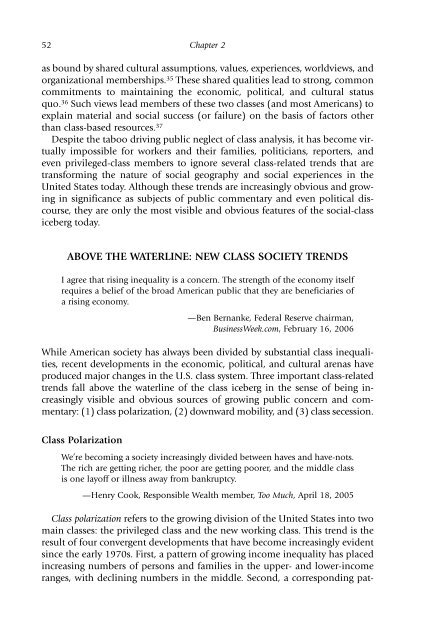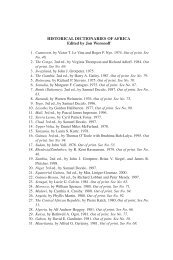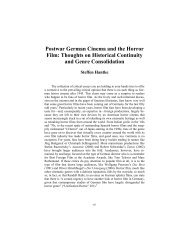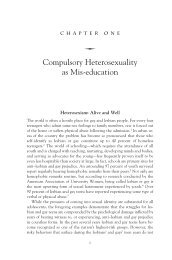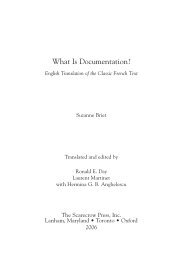Separate Realities: The Dream and the Iceberg - Scarecrow Press
Separate Realities: The Dream and the Iceberg - Scarecrow Press
Separate Realities: The Dream and the Iceberg - Scarecrow Press
Create successful ePaper yourself
Turn your PDF publications into a flip-book with our unique Google optimized e-Paper software.
52 Chapter 2<br />
as bound by shared cultural assumptions, values, experiences, worldviews, <strong>and</strong><br />
organizational memberships. 35 <strong>The</strong>se shared qualities lead to strong, common<br />
commitments to maintaining <strong>the</strong> economic, political, <strong>and</strong> cultural status<br />
quo. 36 Such views lead members of <strong>the</strong>se two classes (<strong>and</strong> most Americans) to<br />
explain material <strong>and</strong> social success (or failure) on <strong>the</strong> basis of factors o<strong>the</strong>r<br />
than class-based resources. 37<br />
Despite <strong>the</strong> taboo driving public neglect of class analysis, it has become virtually<br />
impossible for workers <strong>and</strong> <strong>the</strong>ir families, politicians, reporters, <strong>and</strong><br />
even privileged-class members to ignore several class-related trends that are<br />
transforming <strong>the</strong> nature of social geography <strong>and</strong> social experiences in <strong>the</strong><br />
United States today. Although <strong>the</strong>se trends are increasingly obvious <strong>and</strong> growing<br />
in significance as subjects of public commentary <strong>and</strong> even political discourse,<br />
<strong>the</strong>y are only <strong>the</strong> most visible <strong>and</strong> obvious features of <strong>the</strong> social-class<br />
iceberg today.<br />
ABOVE THE WATERLINE: NEW CLASS SOCIETY TRENDS<br />
I agree that rising inequality is a concern. <strong>The</strong> strength of <strong>the</strong> economy itself<br />
requires a belief of <strong>the</strong> broad American public that <strong>the</strong>y are beneficiaries of<br />
a rising economy.<br />
—Ben Bernanke, Federal Reserve chairman,<br />
BusinessWeek.com, February 16, 2006<br />
While American society has always been divided by substantial class inequalities,<br />
recent developments in <strong>the</strong> economic, political, <strong>and</strong> cultural arenas have<br />
produced major changes in <strong>the</strong> U.S. class system. Three important class-related<br />
trends fall above <strong>the</strong> waterline of <strong>the</strong> class iceberg in <strong>the</strong> sense of being increasingly<br />
visible <strong>and</strong> obvious sources of growing public concern <strong>and</strong> commentary:<br />
(1) class polarization, (2) downward mobility, <strong>and</strong> (3) class secession.<br />
Class Polarization<br />
We’re becoming a society increasingly divided between haves <strong>and</strong> have-nots.<br />
<strong>The</strong> rich are getting richer, <strong>the</strong> poor are getting poorer, <strong>and</strong> <strong>the</strong> middle class<br />
is one layoff or illness away from bankruptcy.<br />
—Henry Cook, Responsible Wealth member, Too Much, April 18, 2005<br />
Class polarization refers to <strong>the</strong> growing division of <strong>the</strong> United States into two<br />
main classes: <strong>the</strong> privileged class <strong>and</strong> <strong>the</strong> new working class. This trend is <strong>the</strong><br />
result of four convergent developments that have become increasingly evident<br />
since <strong>the</strong> early 1970s. First, a pattern of growing income inequality has placed<br />
increasing numbers of persons <strong>and</strong> families in <strong>the</strong> upper- <strong>and</strong> lower-income<br />
ranges, with declining numbers in <strong>the</strong> middle. Second, a corresponding pat-


